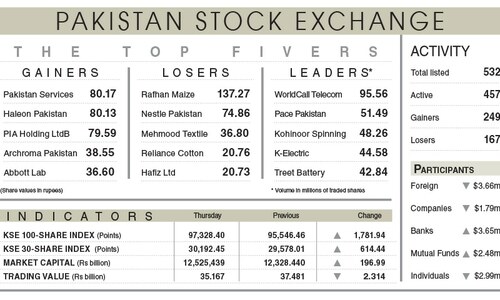NEW YORK: Oil futures fell about 4 per cent to a one-week low on Thursday on a tentative agreement that would avert a US rail strike, expectations for weaker global demand and continued US dollar strength ahead of a potentially large interest rate increase.
Brent futures fell $3.75, or 4pc, to $90.35 a barrel by 10:50 a.m. EDT (1450 GMT), while US West Texas Intermediate (WTI) crude fell $3.58, or 4.1pc, to $84.90.
That puts both benchmarks on track for their lowest closes since Sept 8.“The oil complex is drafting back down on US dollar strength and the tentative agreement that would avert a U.S. rail workers strike,” analysts at energy consulting firm Ritterbusch and Associates said, noting crack spreads were weak.
The US dollar, which hit a 20-year high versus other currencies on Sept 6, has remained close to that peak on expectations the US Federal Reserve will keep boosting interest rates aggressively.
A stronger dollar reduces demand for oil by making the fuel more expensive for buyers using other currencies.
The International Energy Agency said this week that oil demand growth would grind to a halt in the fourth quarter.
Crude prices have dropped substantially after a surge close to its all-time highs in March after Russia’s invasion of Ukraine added to supply concerns, pressured by the prospects of recession and weaker demand.
New clashes between Armenia and Azerbaijan, an oil producer, linked to a decades-old dispute between the ex-Soviet states raised another risk to supplies, although a senior Armenian official said on Wednesday a truce had been agreed.
“Whilst challenging the $100 hurdle is currently not a dead cert, it seems that a bottom at around $90 has been found basis Brent, largely thanks to war-related supply fears,” said Tamas Varga of oil broker PVM.
Other factors weighing on oil prices included an increase in US crude inventories and an expected reduction in energy use by the Ethereum blockchain.
US crude stocks rose by a more than expected 2.4 million barrels, boosted by a record weekly release from the Strategic Petroleum Reserve, which is scheduled to end next month.
The European Union’s executive, meanwhile, plans to raise more than 140 billion euros ($140 billion) to shield consumers from soaring energy prices by skimming off revenues from low-cost electricity generators and making fossil fuel firms share windfall profits.
Published in Dawn, September 16th, 2022















































Dear visitor, the comments section is undergoing an overhaul and will return soon.